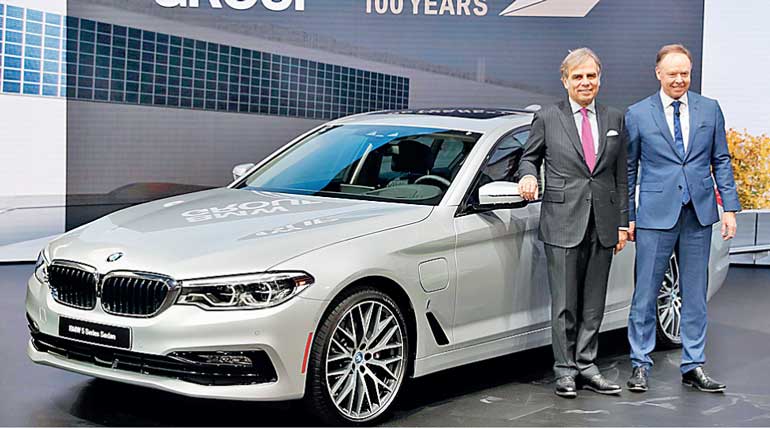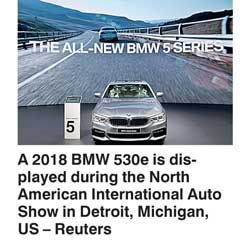Sunday Feb 22, 2026
Sunday Feb 22, 2026
Wednesday, 1 February 2017 00:00 - - {{hitsCtrl.values.hits}}
 Ian Robertson (R), Head of Sales and Marketing for BMW group, and Ludwig Willisch, President and CEO, BMW of North America, stand with a 2018 BMW 530e during the North American International Auto Show in Detroit, Michigan, US – Reuters
Ian Robertson (R), Head of Sales and Marketing for BMW group, and Ludwig Willisch, President and CEO, BMW of North America, stand with a 2018 BMW 530e during the North American International Auto Show in Detroit, Michigan, US – Reuters
 London (Reuters): Britain should retain tariff-free access to the European Union’s single market, Germany’s BMW said on Tuesday, while a UK car industry body called for participation in the EU’s customs union to hold onto trade after Brexit.
London (Reuters): Britain should retain tariff-free access to the European Union’s single market, Germany’s BMW said on Tuesday, while a UK car industry body called for participation in the EU’s customs union to hold onto trade after Brexit.
In a major speech, Prime Minister Theresa May said that Britain would leave the EU’s single market and cannot remain a full member of its tariff-free zone but will seek unfettered trade with the bloc.
But BMW, which produces its Mini range at its plant near Oxford, which accounts for more than 10% of all British-built cars, said May should press for barrier-free trading terms with the EU.
“We acknowledge the Prime Minister’s announcements today and urge her to ensure the UK’s negotiations with the EU result in uncomplicated, tariff-free access to the EU single market in future,” a spokeswoman said.
The customs union is highly valued by the car industry as nearly 60 percent of the parts in an average British-assembled car are made abroad and some components travel to and from the continent several times in the manufacturing process.
The Society of Motor Manufacturers and Traders said that the overwhelmingly foreign-owned sector, which built more cars last year than in any other for over a decade, must retain the key elements of unfettered trade in order to keep prospering.
“We need ... a deal which includes participation in the customs union to help safeguard EU trade, trade that is tariff-free and avoids the non-tariff and regulatory barriers that would jeopardise investment,” Chief Executive Mike Hawes said in an emailed statement.
Asked about the possible implications of free trade where Britain is outside the customs union, Hawes told lawmakers before May’s speech that British-built cars may not comply with the criteria set down in the average free-trade deal.
“The danger is that UK-built cars may not qualify under most normal free-trade agreements,” he said.
“Generally rules of origin require around 50 to 55% local content. Currently in the UK, the average car has about 41% local content. Being part of the customs union, basically European content counts so that’s not an issue.”
Global automakers have also warned that a return to World Trade Organisation tariffs of 10% on car exports and around 3% on engines could make their British plants uncompetitive.
Last year, Japanese carmaker Nissan asked for a pledge of compensation if its plant was hit by Brexit but went on to invest in two new models after what a source described as a government promise of extra support to counter any loss of competitiveness.
On Tuesday, May suggested the car industry may be able to retain elements of the free trade terms currently enjoyed as part of the single market under a new accord.
“That agreement may take in elements of current single market arrangements in certain areas - on the export of cars and lorries for example,” she said.